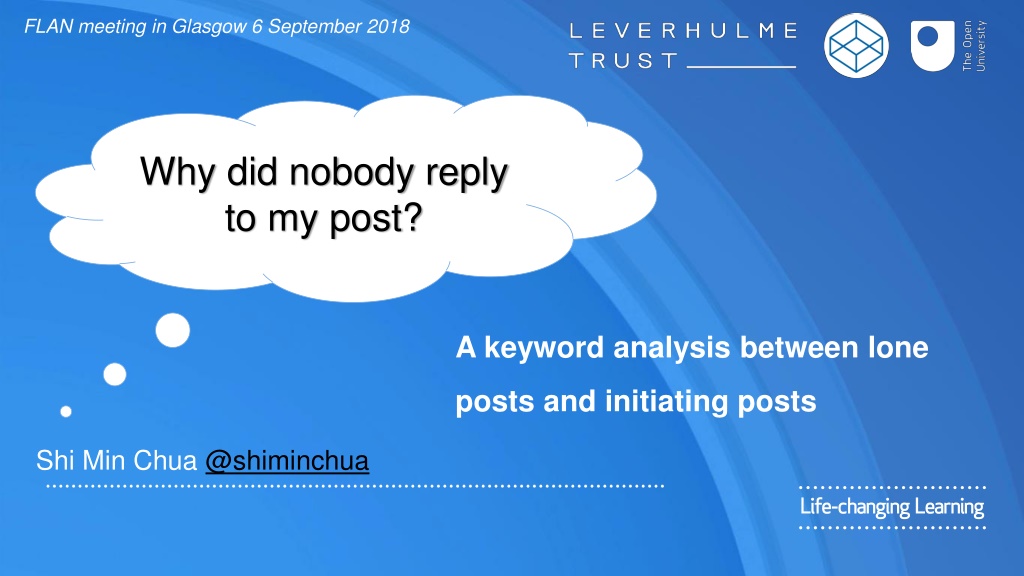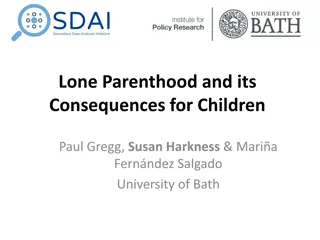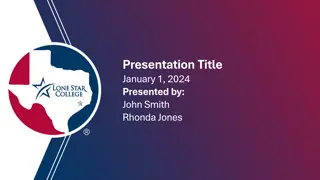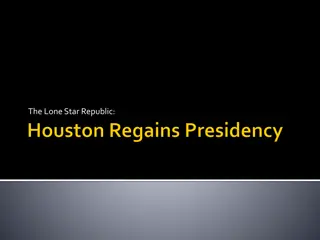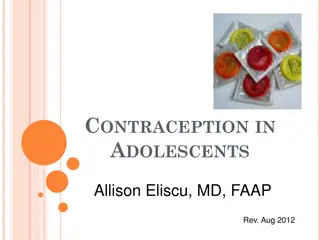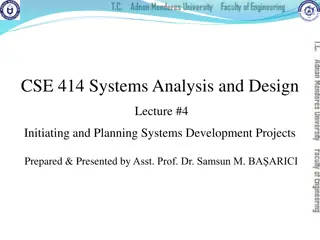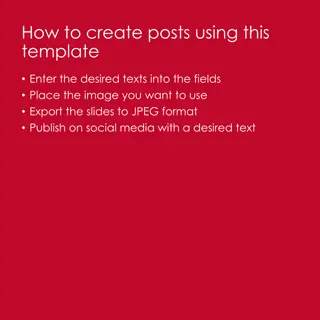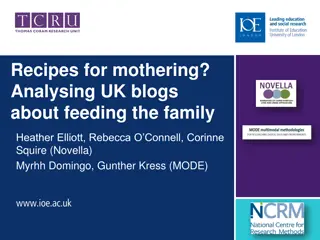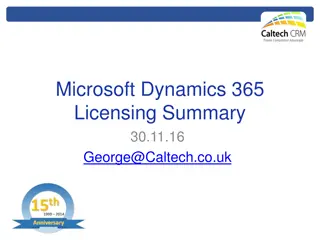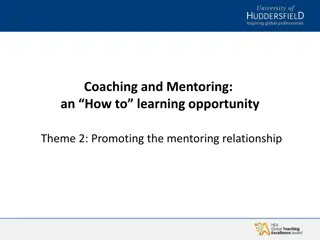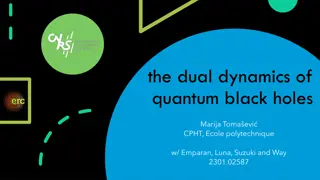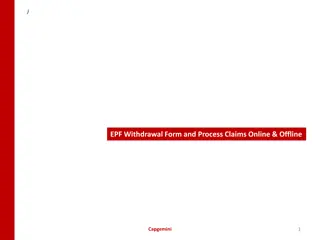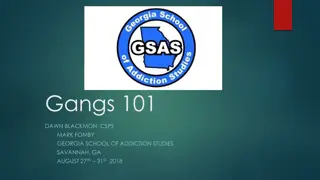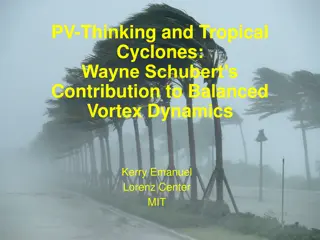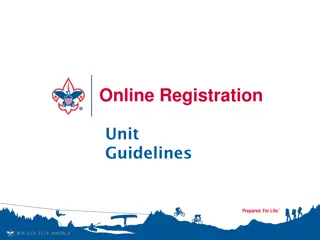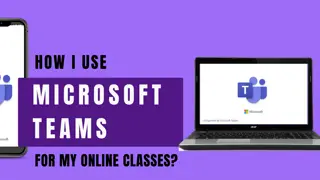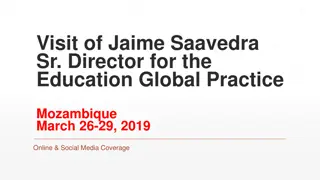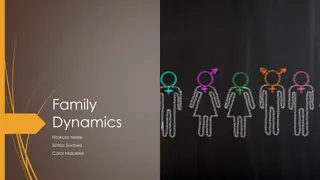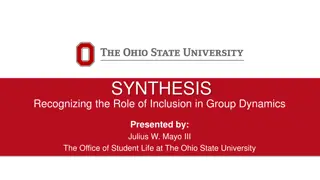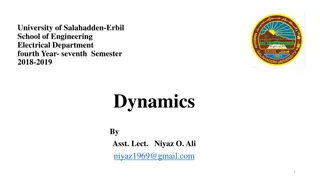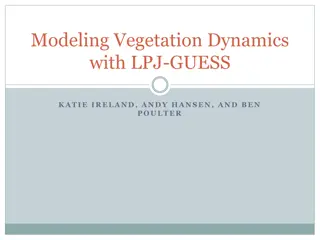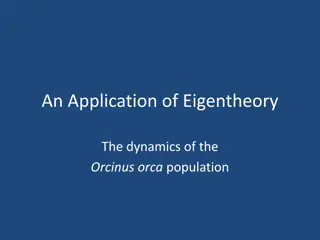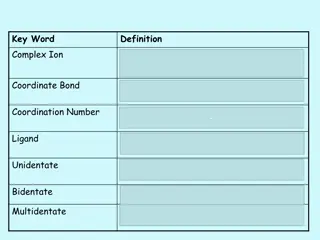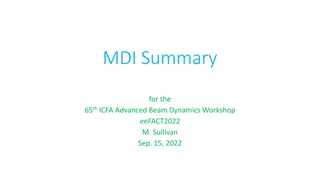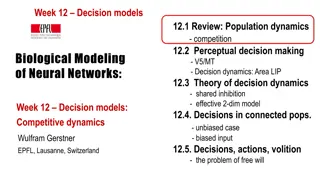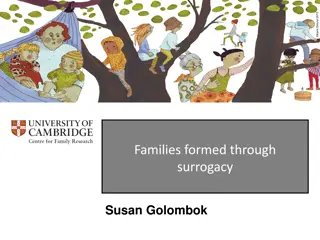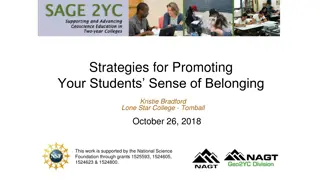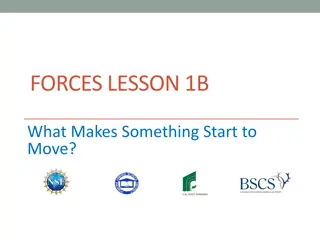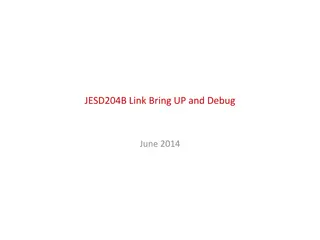Understanding the Dynamics of Online Posts: Initiating vs. Lone Posts
Exploring the phenomenon of lone posts and initiating posts in online discussions, this analysis delves into the reasons for lack of response, motivations for initiating posts, and the impact on further engagement. The study reveals insights on the patterns, features, and significance of different post types in fostering interactive and meaningful discourse in digital spaces.
Download Presentation

Please find below an Image/Link to download the presentation.
The content on the website is provided AS IS for your information and personal use only. It may not be sold, licensed, or shared on other websites without obtaining consent from the author. Download presentation by click this link. If you encounter any issues during the download, it is possible that the publisher has removed the file from their server.
E N D
Presentation Transcript
FLAN meeting in Glasgow 6 September 2018 Why did nobody reply to my post? A keyword analysis between lone posts and initiating posts Shi Min Chua @shiminchua
Types of Posts Number of Posts Number of Tokens Lone Post 117863 6162230 32080 2401795 Initiating Post 54172 2642195 Reply
Overabundance of Lone Posts in CMC Usenet groups (Burke et al., 2007; Himelboim, Gleave, & Smith, 2009) Online news commenting spaces (Ziegele, Breiner, & Quiring, 2014) Distance learning online discussion (Dennen & Wieland, 2007) Why? Stylistic and linguistic features Levelling ground, not constrained by face-to-face conversation (Cavangah, 2007) Content (Joyce, Anand, Kraut, 2014; Ziegele et al., 2014) Time of posting (Jeong & Frazier, 2008) Size & topic (Himelboim, 2008)
Motivation for examining Initiating Posts vs. Lone Posts Probability of posting again increased (Joyce & Kraut, 2006) Join the discussion for interactive purposes rather than cognitive gains (Springer, Engelmann, & Pfaffinger, 2015) Initiate direct and explicit interaction, which is essential for dialectical, critical discourse and argumentation (Rourke & Kanuka, 2007) Meaning-making and co-construction (Stahl, 2003) MOOC learners may feel frustrated if their posts are seldom responded to (Hew & Cheung, 2014)
Motivation for examining Initiating Posts vs. Lone Posts Conversation with oneself or learning materials (Laurillard, 2012).
Keyword Analysis: Cut-off Criteria Comparing initiating posts to lone posts Learners Lone Posts 77 Initiating Posts 70 the log-likelihood ratio test, p < 0.000000000001 (Flowerdew, 2015) Keywords Keyness indicator (effect size): Bayes Factor > 10 (Wilson, 2013) example Normalized frequency > 5 per 100,000 (McEnery, 2016) Raw frequency Normalized Frequency 2574 1324 Dispersion Measure, Gries Deviation of Proportion (Gries DP, Gries, 2008; Lijffijt & Gries, 2012) < 0.30 0.00042 0.00055
Analysis of Keywords Step 1 Concordance lines of each keyword Salient meaning/function (McEnery, 2016) Biber et al (1998), Wmatrix (Rayson, 2017), Labelling Step 2 Functional grouping of keywords Interpretations based on groups of keywords Categorized based on function related to dialogic learning and MOOCs Grouping Step 3 Discourse/conversation analysis of selected keywords (O Keeffe & Walsh, 2016) Case Studies
Dialogic Expansion Dialogic Contraction v.s. Martin & White (2004) Monoglossic Categorical or bare assertion No reference of others viewpoint Heteroglosia (Baktin, 1986) Alternative voices Represents the proposition as but one of a range of possible positions Allows dialogic alternatives The banks have been greedy. In my view the banks have been greedy. Modals, Hedges, Boosters, Pronouns, Evaluatives (Fairclough, 2003) Stance and intersubjectivity (Du Bois, 2007)
Stance Expression Initiating Posts Lone Posts Modal expression might, would, could will, need, able Hedging perhaps, seems, sort Quantifier any all, lot, much, every Epistemic expression wonder, wondering aware, understanding, learned this is perhapsbecause we tend to This mightmean actually walking I wonderwould the microbial diversity also mirror We needto be more exact I needto be ambidextrous ...money taken in by a Company is not all down to their own effort, it relies on
Stance Expression Initiating Posts Lone Posts Booster surely, just, rather, else really, very, definitely, always feel, feeling, think, agree, keen, hope, hoping, looking, forward, enjoy, enjoyed, love Mental verbs difficult, easy, excellent, better, interesting, informative, great, important, good, new Evaluative wrong Negation cannot, ca, n't Really looking forward to learn Ienjoyed this course and definitely learneda lot in Excellent range of resources, thanks! I agree with this definition regarding health I really don tsee the point of
Pronouns Initiating Posts he Lone Posts I, my, our, their Pronouns anybody, anyone everyone Indefinite pronouns Addressing general audience, instead of you which is used in one-to-one setting (Tagg, 2012) Arbitrary instead of all inclusive (Biber et al, 1998)
Keyword: anybody in initiating posts Request for recommendation So, does anybody have a good suggestion for a text book on Anaconda, Python and Pandas? Offering recommendation Suggest anybody else that may still be receiving 'file not found' for exercise 6 could try the same thing Looking for shared experience Is it just me or does anybody else have issues find <sic> the PwC paper? Is this a frequent phrase?
Keyword: everyone in lone posts Greetings: Among 4375 instances, 975 Hi everyone , 868 Hello everyone Appreciation: 428 Thank(s) everyone Making stances -104 not everyone - we need everyoneto control our daily waste Narrative especially when considering the spread of disease and how closely everyone lived in the cities
Questions and Request Keywords in initiating posts: anybody, anyone, question, please, ?, wonder, wondering, why Question: does anybodyknows what kind ? Initiating Posts Lone Posts Discourse Particles please, sorry thanks, thank Punctuation , -();?"': !. Meta-language question, article information, course, knowledge
Conclusions Initiating posts: Questions and hedging to show uncertainty Addressing with indefinite pronouns, so anyone could respond, give agency to others Negation to voice out alternatives Lone posts: Appreciation, Emotion, Evaluation Agreement Self-mention
Acknowledgement Dr Caroline Tagg, Prof Mike Sharples, Prof Bart Rienties Leverhulme Trust Course Providers shimin.chua@open.ac.uk
